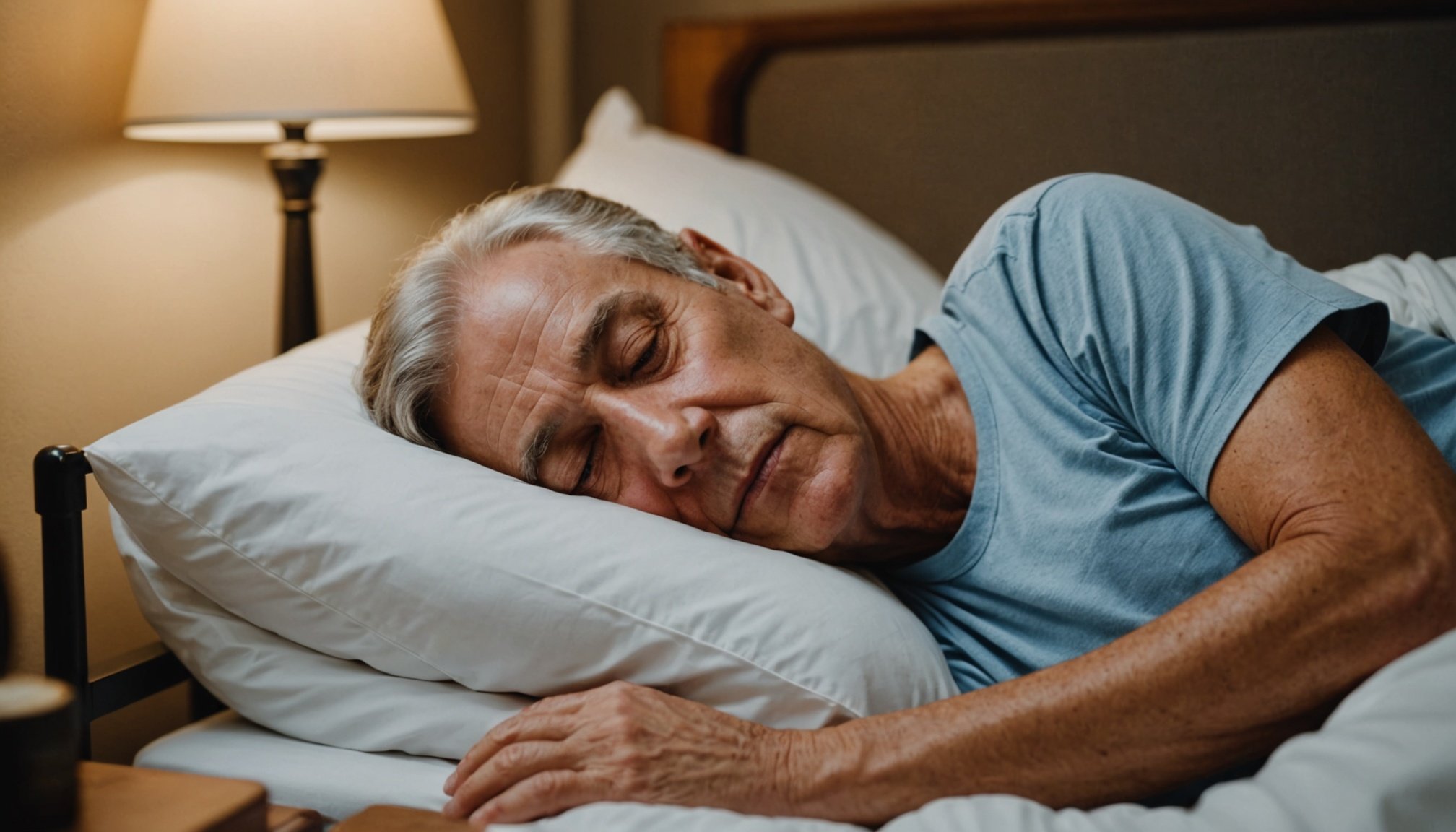Understanding Chronic Insomnia in Seniors
Chronic Insomnia is a persistent sleep disorder affecting older adults, characterized by difficulty falling asleep, staying asleep, or early waking without returning to sleep. Symptoms of chronic insomnia in seniors include restlessness, daytime fatigue, mood disturbances, and decreased cognitive function. These challenges intensify as aging alters the sleep architecture, reducing deep sleep phases and increasing night-time awakenings.
Sleep Challenges in Aging
Sleep disturbances in older adults often arise from multiple causes. Physiological changes due to aging, such as reduced melatonin production and altered circadian rhythms, significantly contribute to sleep challenges. Additionally, health conditions like arthritis, diabetes, and cardiovascular diseases, as well as the medications used to treat these, can exacerbate sleep issues. Anxiety and depression, common in seniors, also impact their sleep patterns.
This might interest you : Essential Mobility Scooter Features Every Senior Should Consider
Impact on Health and Well-being
The impact of chronic insomnia on seniors’ health and well-being is profound. It can lead to increased risks of cardiovascular diseases, deteriorated mental health, weakened immune response, and impaired memory and concentration. Chronic insomnia disrupts life quality, leading to a higher dependency on healthcare services and diminishing independence. Addressing this issue is crucial for improving seniors’ life satisfaction and overall health trajectory.
Importance of Bedtime Rituals
Establishing sleep hygiene involves creating conditions that promote sound sleep patterns and reduce disturbances. It’s like giving your body a gentle nudge towards relaxing and unwinding. A vital component of sleep hygiene is developing bedtime routines that condition your mind and body for rest.
Topic to read : Identifying Overmedication in Seniors: Key Signs and Effective Management Strategies
Engaging in consistent bedtime rituals can significantly enhance your sleep quality. By following regular bedtime routines, you train your body to recognize these cues as signals that it’s almost time for rest. This consistency helps regulate your internal clock, making it easier to fall asleep and wake up at the same time every day, ultimately promoting better overall health.
What makes these rituals effective is their ability to foster relaxation. Activities like reading a book, taking a warm bath, or practicing meditation can serve as vital components of bedtime routines. They not just calm the mind but also physically relax the body, making the transition from wakefulness to sleep smoother.
Furthermore, these rituals help reduce stress and anxiety by creating a familiar environment that feels safe and comforting. As your body anticipates the comforting predictability of your nightly routine, it becomes easier to shift into a state conducive to rest. Thus, a well-crafted bedtime routine is a simple yet powerful ally in achieving optimal sleep hygiene.
Effective Bedtime Rituals
Incorporating effective bedtime rituals can significantly enhance sleep quality, especially for seniors. These rituals involve calming practices, such as meditation and other relaxation techniques, which ease the transition towards restful sleep.
Incorporating Relaxation Techniques
Relaxation techniques play a pivotal role in sleep preparation. Seniors may find deep breathing exercises beneficial; these exercises can be tailored easily to fit individual comfort levels. For instance, inhaling deeply through the nose and exhaling slowly through the mouth aids in reducing anxiety.
Additionally, gentle stretching or yoga routines can promote physical and mental relaxation. These activities increase body awareness and calm the mind, making it easier to fall asleep.
Finally, guided imagery and visualization methods are powerful meditation tools. These techniques, involving the creation of mental images associated with peacefulness, provide a structured form of relaxation that diverts the mind from daily stresses.
Creating a Sleep-Inducing Environment
Optimizing the bedroom environment is a key element of sleep preparation. Reducing noise and light exposure vastly improves sleep onset, as a quiet and dimly lit room encourages the body to produce melatonin, the sleep hormone. A cool room temperature, alongside comfortable bedding, contributes significantly to an inviting sleeping atmosphere.
Limiting Stimulants and Distractions
Dietary choices have a profound impact on sleep quality, with caffeine and sugar decreasing the ability to fall asleep. Electronic devices are another factor. Exposure to screens should be minimized before bedtime to avoid the stimulating blue light they emit, which can delay the onset of sleep.
Implementing techniques to wind down at the day’s end, like setting boundaries or engaging in calming practices, prepares the body for rest effectively.
Expert Insights and Testimonials
Understanding sleep solutions that benefit senior health often requires a multi-faceted approach. Experts recommend simple yet effective bedtime rituals as a cornerstone for improving sleep in older adults. Common strategies include maintaining a consistent sleep schedule, reducing screen time before bed, and creating a comfortable sleeping environment. These expert opinions often underscore the importance of tailoring solutions to individual needs, ensuring that each strategy is both practical and achievable.
Sleep Solutions for Seniors
Experts in senior health advocate incorporating habits that signal to the body it’s time to wind down. Dr. Emily Harper, a geriatric sleep specialist, notes that calming activities, like reading or light stretching, can be instrumental. Scientific studies reflect these expert opinions, showing that even small adjustments can significantly enhance sleep quality.
Testimonials
Many seniors attest to the benefits of implementing these sleep strategies. A testimonial from Margaret Jackson, 72, illustrates this well: “Adopting a bedtime ritual like listening to classical music has truly transformed my nights.” Testimonials like Margaret’s showcase real-world success, indicating the practical benefits of expert-recommended sleep solutions for seniors, reinforcing the assertion that tailored bedtime rituals can transform sleep quality and overall well-being.
Addressing Common Sleep Problems
Effective sleep is essential for overall health, particularly for seniors who often face nighttime awakening and other sleep disorders. Understanding these challenges can lead to better rest and well-being.
Understanding Nighttime Awakening
Nighttime awakening can be caused by various factors, including stress, inconsistent sleep routines, or sleep disorders. Frequent waking may result in reduced sleep quality, leading to daytime fatigue and decreased cognitive function. To minimize disruptions, establish a calming bedtime routine and maintain a consistent sleep schedule. Avoiding caffeine and screen time before bed can also help. Consulting healthcare professionals is crucial in identifying underlying causes and developing personalized strategies tailored to individual senior sleep challenges.
Recognizing Sleep Disorders
Common sleep disorders affecting seniors include insomnia, sleep apnea, and restless legs syndrome. Signs like prolonged difficulty falling asleep, loud snoring, or frequent gasping during sleep may indicate the need for professional assessment. Treatments range from lifestyle modifications to medical interventions, and resources such as sleep clinics and support groups are available for assistance.
Building a Long-term Sleep Strategy
Creating a long-term strategy involves continuously adjusting rituals and evaluating sleep patterns as they evolve. Encourage ongoing assessment by reflecting on what’s effective and what isn’t. This adaptable approach ensures sustained improvements in senior sleep quality over time.










